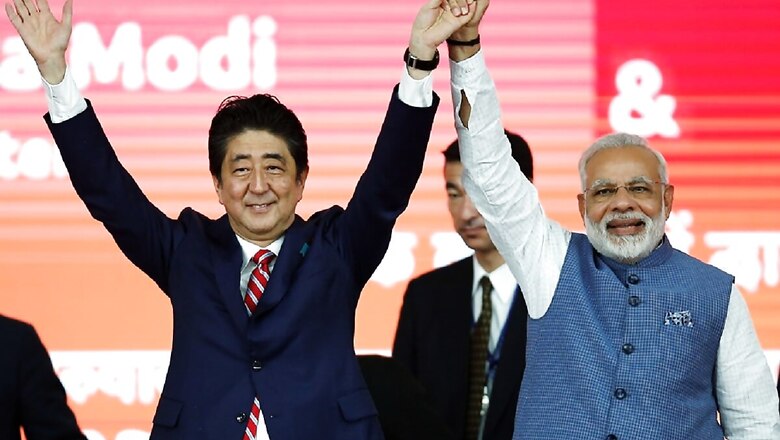
views
After years of negotiations, India and Japan have inked a landmark agreement that will allow their militaries to access each other's bases for logistics support, a key development that comes in the backdrop of growing concerns over China's military muscle flexing in the region. The acquisition and cross-servicing pact was signed by Defence Secretary Ajay Kumar and Japanese Ambassador Suzuki Satoshi, a defence ministry spokesperson said on Thursday.
The agreement provides for creation of an enabling framework for closer cooperation and interoperability, besides allowing militaries of the two countries to use each other's bases and facilities for repair and replenishment of supplies, the official said. Prime Minister Narendra Modi and his Japanese counterpart Shinzo Abe, who held a telephonic conversation earlier in the day, welcomed the signing of the "Agreement on Reciprocal Provision of Supplies and Services" between the Indian Armed Forces and the Self-Defense Forces of Japan.
The two leaders concurred that the pact will further enhance the depth of defence cooperation between the two countries and contribute to peace and security in the Indo-Pacific region, according to a release from the external affairs ministry here. The signing of the agreement comes at a time India is locked in a bitter border row with China, and rising concerns among countries in the region over increasing Chinese assertiveness in the Indo-Pacific region.
A statement by Japanese foreign ministry said the agreement will promote closer cooperation between the militaries of the two countries, and enable them to actively contribute to international peace and security. "It is expected that the agreement will facilitate the smooth and prompt provision of supplies and services between the Self-Defense Forces of Japan and the Indian Armed Forces," it said.
The defence ministry said the pact will enhance the interoperability between the armed forces, resulting in further expansion of bilateral defence engagement under the Indo-Japan special strategic and global partnership. "The agreement establishes the enabling framework for closer cooperation between the armed forces of India and Japan in reciprocal provision of supplies and services," it said.
In June, India and Australia sealed a similar Mutual Logistics Support Agreement (MLSA) while resolving to scale up their overall defence cooperation. India has already signed similar agreements with the US, France and Singapore.
India has been signing MLSAs with countries primarily eyeing deeper maritime cooperation which is important considering China's rapid military expansionism in the Indo-Pacific, Indian Ocean and South China Sea. The pacts signed with the US and France provide for accessing various crucial bases by Indian military in Djibouti, Guam and the Reunion Islands among others.
India is also expanding overall strategic cooperation with Japan in the Indo-Pacific region under the framework of four nation coalition 'Quad'. In November 2017, India, the US, Australia and Japan gave shape to the long-pending "Quad" to develop a new strategy to keep the critical sea routes in the Indo-Pacific free of any influence.
The US has been pushing for a greater role for India in the Indo-Pacific which is seen by many countries as an effort to contain China's growing clout in the region. In June, the Indian Navy carried out a maritime exercise with the Japanese navy as part of efforts to bolster military cooperation.
The Indian Navy has significantly expanded its deployment in the Indian Ocean Region, deploying a plethora of warships and submarines following the border row with China in eastern Ladakh. The maritime space around the Malacca Strait, one of the world's busiest shipping lanes, is very critical for China's supply chain through sea routes.




















Comments
0 comment